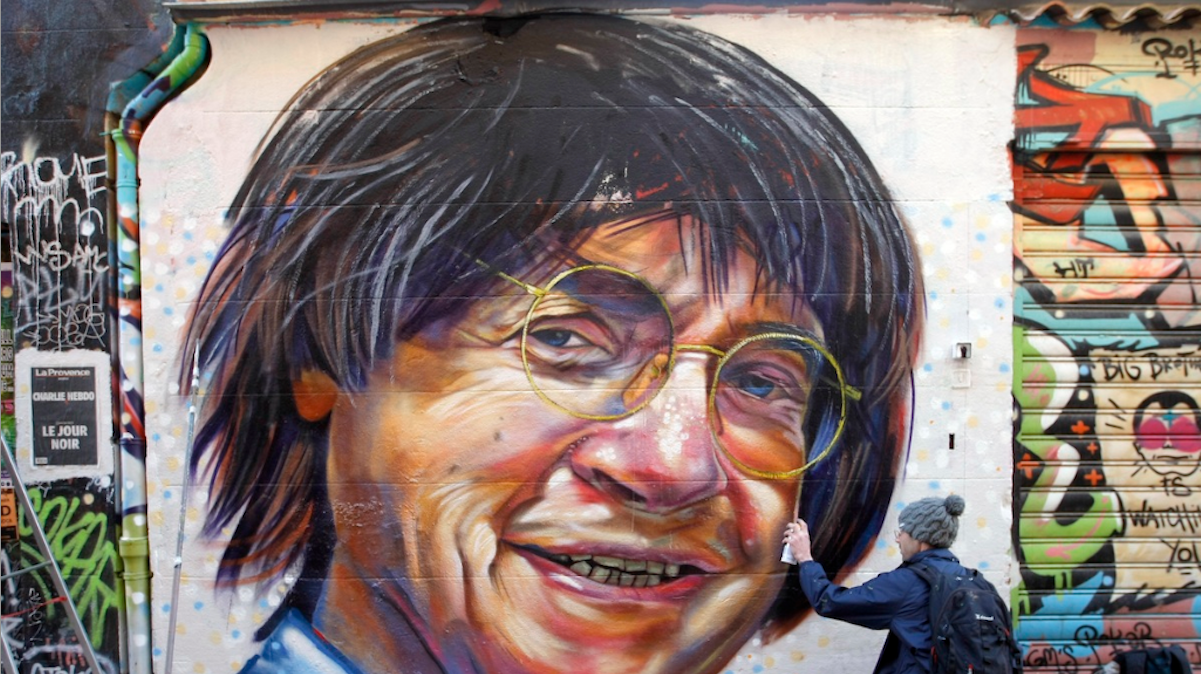Charlie Hebdo attack shows that freedom isn’t free

The artist Julien paints a portrait of the French cartoonist Jean Cabut, also known as Cabu, as a tribute to him, in Marseille, southern France, Friday Jan. 9, 2015. Masked gunmen stormed the offices of a satirical newspaper Charlie-Hebdo Wednesday, and killed 12 people: eight journalists, including Cabu, two police officers, a maintenance worker and a visitor were killed in the attack. (AP Photo/Claude Paris)
Freedom isn’t free. That refrain has danced in my head since the tragic murders of 12 people at Charlie Hebdo magazine in Paris.
The satirical publication had long faced threats from Islamic extremists who believed the magazine’s cartoons insulted the Islamic Prophet Muhammad.
In 2011, the threats morphed into violence when the magazine’s offices were bombed. And on Wednesday, disaster struck when gunmen burst in and shot a dozen people to death.
Disrespectful, but protected
I have seen the cartoons in question, and while I am not a Muslim, I believe the drawings were disrespectful.
And while my personal journalistic ethics compel me to avoid disrespecting the sacred beliefs of others without good reason, I defend the right of the Charlie Hebdo cartoonists to freely express themselves.
In a free society, even unpopular speech must not be quelled by violence. Instead, we should answer ignorance with knowledge.
That’s why I believe Cherif and Said Kouachi, the gunmen who allegedly attacked the magazine’s offices and were subsequently killed in a raid by French police, did great harm to their cause.
They answered ignorance about their religion with violence that did not reflect their religion’s true nature. In doing so, they stirred up a cauldron of hate.
The anti-Muslim sentiments I have heard in the wake of the attack are both dangerous and predictable, because grief produces anger, and prejudice exacerbates fear.
What now?
While those sentiments will eventually retreat into the background, I am keenly interested in what will happen next.
Will the French people come together to discuss their religious differences in the wake of this calamity?
And, just as important, will the craft of journalism come out of this incident determined to tell the truth?
That truth, quite simply, is that our words and pictures have the power to do all manner of things.
They can build up or tear down.
They can praise or they can curse.
They can inform or entertain.
And they can do so because in countries like ours, we have freedom of expression.
But freedom isn’t free.
Accountability for words
With freedom comes responsibility.
That means we must stand behind every word we write, every picture we draw and every thought we share.
It means we are responsible for our words, not only because we have to live with them, but because others must live with them as well.
If I want to stir emotion in my readers, I know how to do so, because words are the tools of my craft, and I am free to use them as I wish. But if the purpose of my words is only to hurt others, then in my view, I haven’t used my freedom wisely.
After all, freedom isn’t free.
Should we offend people as journalists? Yes. We should, and I have often done so. But if I am to offend others with my words, I hope to do so in the cause of teaching.
If I hurt people with my opinions, I hope to do so with an eye toward healing. If I damage others with the words I write, I hope to do so in pursuit of truth. It is, after all, the truth that we should be seeking.
I grieve for the journalists of Charlie Hebdo, and while I disagree with much of what they portrayed in their own pursuit of truth, I respect their freedom to do so.
It is a freedom that editor Stephane Charbonnier spoke of when questioned about the threats that had been made against the magazine.
“I’d prefer to die standing than live on my knees,” he said.
Sadly, Charbonnier did just that. He died standing for what he believed in, and in doing so, he brought into focus the words that have swirled in my head ever since.
Freedom isn’t free.
WHYY is your source for fact-based, in-depth journalism and information. As a nonprofit organization, we rely on financial support from readers like you. Please give today.


